The interview took place on July 27, exactly one year after the Verkhovna Rada approved the appointment of Andriy Kostin, then a member of the ruling Servant of the People faction and Chair of the Parliamentary Committee on Legal Policy, as Prosecutor General by 299 votes. Before becoming an MP, Mr. Kostin was the director of the law firm Pravo, and Deputy Chairman of the Odesa Oblast Bar Council.
The first thing he did after taking the position of Prosecutor General was to appoint Oleksandr Klymenko, the winner of the competitive selection process who had been waiting for this appointment for almost 7 months, as the Head of the Specialized Anti-Corruption Prosecutor’s Office.
Ukrinform spoke with Mr. Kostin about the prospects of giving more independence to the SACPO, about cooperation with international law enforcement agencies and the setting up of a Special Tribunal against the Russian leadership for the crime of aggression against Ukraine. We also discussed the most high-profile cases against Russian war criminals, traitors and collaborators, the investigation into the death of senior officials of the Ministry of Internal Affairs, and the problems facing Ukraine’s law enforcement system.
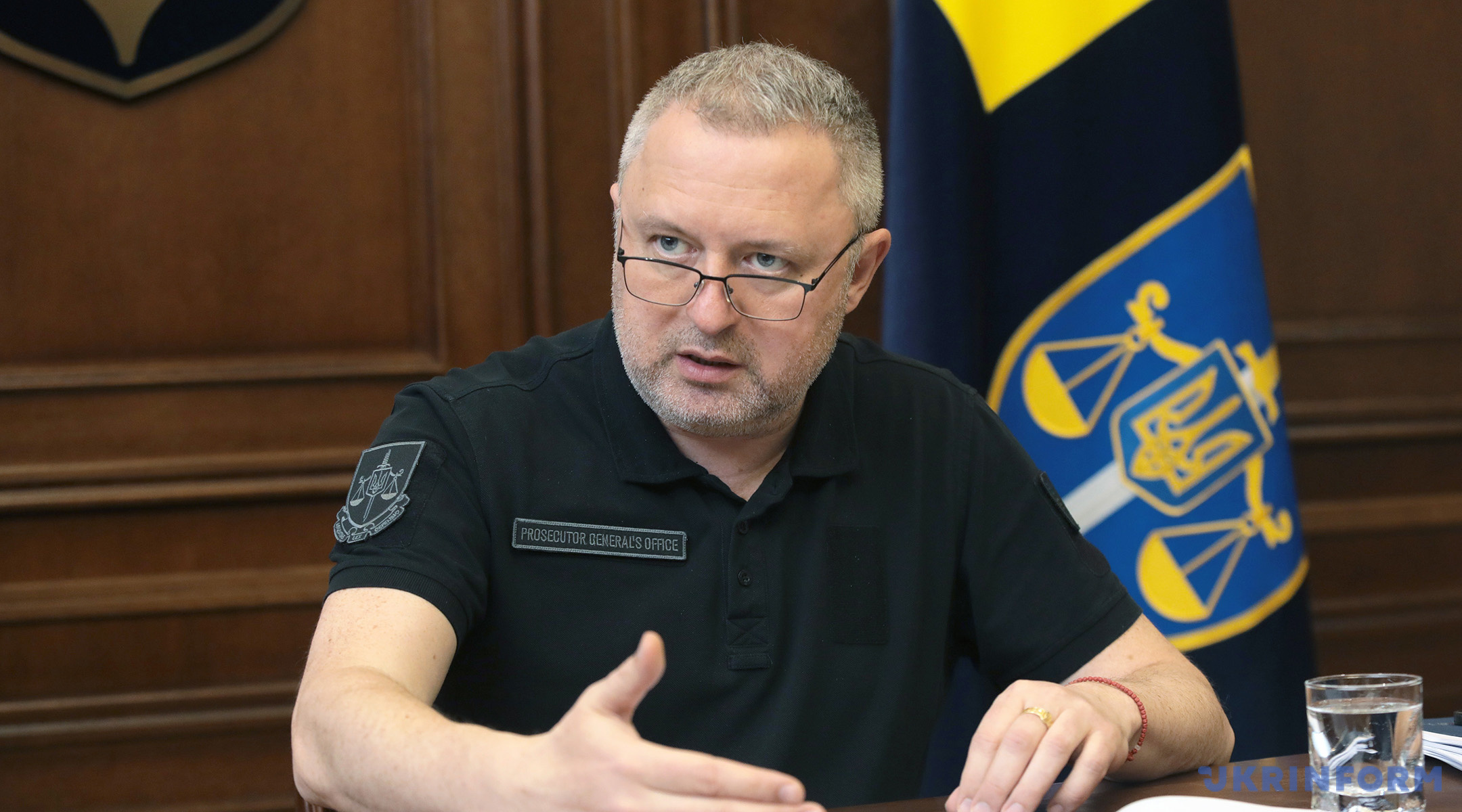
WE COOPERATE WITH THE ICC ON LARGE-SCALE WAR CRIMES
- Mr. Kostin, it’s been a year since you were appointed Prosecutor General. How would you assess the results of this year? Which areas were given priority during this time? What did you focus your efforts on?
- It has been an extremely difficult and intense year with unprecedented challenges. If I were to point out only one major achievement, it would be unity and coordinated efforts. Both within the country and with international partners. At the international level, the main thing is that we have started building a comprehensive network of accountability for Russia’s international crimes. Previously, partners had acted in parallel. We were the first to talk about the need for a unified architecture. Today, everyone is talking about it.
I made my priorities publicly known when I was elected to this position. The investigation of war crimes is definitely a priority, and this is where cooperation with our partners is at its highest.
They see how we proceed in this direction and they help us. For example, certain experts assist us in specific cases, because situations occur where we want to ascertain if what we’ve been doing is really right in terms of the international criminal law or international humanitarian law application practice. That is why we are advised by experts in various fields of activity.
Some experts help to develop strategic documents. The next step was to build the right prosecution work within the Ukrainian law enforcement system itself. We had to make sure that everything we did would be perceived as a fair trial in terms of European standards.
At the international level, the main thing is that we have started building a comprehensive network of accountability for Russia’s international crimes
- Which international organizations does the Office of the Prosecutor General cooperate with the most in investigating war crimes?
- We have an unprecedented level of involvement by international partners and cooperation on war crimes cases with such institutions as the International Criminal Court, the U.S. Department of Justice, the FBI, Eurojust, and Europol. And also, with prosecutors from the JIT member countries (Joint Investigation Team, which includes Ukraine, Poland, Lithuania, Estonia, Latvia, Slovakia and Romania as well as Eurojust and the ICC — Ed.). Furthermore, there are prosecutor’s offices in the countries that have instituted their own criminal proceedings to investigate Russian war crimes in Ukraine. We also cooperate in such matters as fighting corruption and ensuring transparency in the process of rebuilding Ukraine. We have established cooperation with OLAF, the Office of the EU Public Prosecutor Laura Kövesi, and the U.S. Inspectors General.
The result is the well-known historic arrest warrant for Putin, the investigation of war crimes and the tracking down of Russian money, the search for deported children, the creation of the Register of Damage for Ukraine by the Council of Europe, the opening of the International Center for the Prosecution of the Crime of Aggression against Ukraine, and a dialogue on setting up a Special Tribunal.
- A question pops up about international cooperation. It has been reported that U.S. President Joe Biden ordered his administration to begin sharing evidence of Russian war crimes in Ukraine with the ICC. This is about the U.S. intelligence services providing information on the decision by Russian officials to deliberately target Ukrainian civilian infrastructure. What do you know about this?
- I can confirm this information. This is a nice signal. Back in December last year, the U.S. parliament passed a relevant law that, within the limitations, gives them the right to cooperate with the ICC. This is the outcome of our joint communication with a wide range of partners, including our colleagues from the U.S. Department of Justice, the State Department, the Senate and the House of Representatives of the U.S. Congress. Through our joint efforts, this decision has been adopted and is being implemented. As a result, the ICC will be able to obtain additional information on who is behind the war crimes in Ukraine. This is not about merely identifying the perpetrators, but about the entire chain of command, up to the highest levels of Russian leadership. We really need this information.
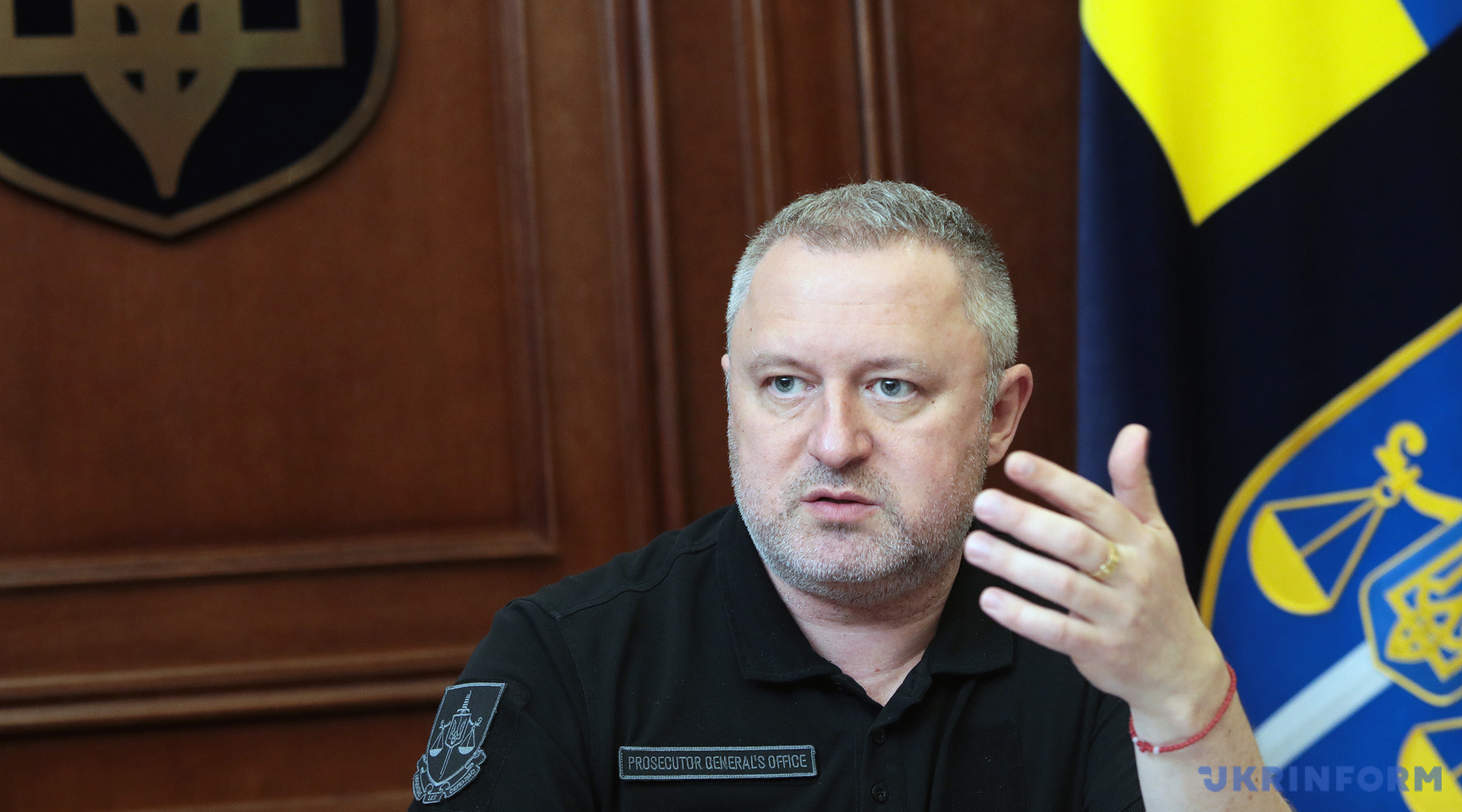
- Does President Biden’s decision mean that the ICC may soon issue a new arrest warrant against Russian top officials for shelling Ukrainian civilian infrastructure?
- We collaborate with the ICC team on a daily basis. We have prioritized areas of activity; we even have an activity plan for this year and we’ve been drafting the next year’s plan. For obvious reasons, I’m not going to comment on any proceedings that have become top priority in our cooperation. I can only say that we are working hard together on cases of war crimes of a large-scale nature.
We cannot allow any signatory state to the Rome Statute to violate its obligations
- After the Kakhovka HPP was blown up, the ICC representatives inspected the site to collect evidence. Am I right in thinking that the ICC is conducting its own investigation of this incident, which will result in charges being brought?
- On the very same day, I officially contacted the ICC about the war crime committed at the Kakhovka HPP. Three days later, the ICC team and I visited Kherson, Dnipro, and Mykolaiv Oblasts, so they saw everything with their own eyes. Our cooperation on this crime case continues. Basically, this is all I can comment on now.
- After the ICC’s March arrest warrant for Putin, which obliges the signatory states to the Rome Statute to extradite him, it has recently become known that the Russian dictator changed his mind about attending the BRICS summit in Johannesburg this August. Instead, Lavrov will be there, while the Russian president will allegedly participate online. As of now, is Putin’s isolation a good result of the ICC warrant?
- Let me put it this way. We cannot allow any signatory state to the Rome Statute to violate its obligations; therefore, we will always insist that the ICC arrest warrant be executed by all countries that are parties to the Rome Statute. That is self-evident.
The universal understanding now is that the Special Tribunal must be set up, while the only question is what kind of tribunal it is going to be.
- The International Center for the Prosecution of the Crime of Aggression Against Ukraine (ICPA) opened in The Hague a month ago. The ICC Prosecutor Karim Khan attended the press conference held at Eurojust on the occasion of the ICPA inauguration. Based on the information that you have, will the International Center cooperate with the ICC? Would it, in particular, share evidence?
- The Office of the ICC Prosecutor is a member of the Joint Investigation Team (JIT) under which the ICPA was founded. Therefore, such cooperation will indeed take place. This includes the exchange of available evidence. We have broad support for the investigation of the crime of aggression. Some JIT member countries are going to send their prosecutors there. Besides, a similar statement was made by the U.S. Attorney General Merrick Garland, and we have already met the prosecutor who will work there. The ICPA is preparing cases for the future Special Tribunal for the Crime of Aggression Against Ukraine. Therefore, the wider the geography of the ICPA team members, the stronger the trust in the outcome of its work.
I gathered my colleagues who work there and set an ambitious goal before them — draw up a model suspicion by the end of this year. Why am I talking about a model suspicion? The final suspicion will be drafted by the prosecutors’ portion of the Special Tribunal. In principle, the universal understanding now is that the Special Tribunal must be set up, while the only question is what kind of tribunal it is going to be.
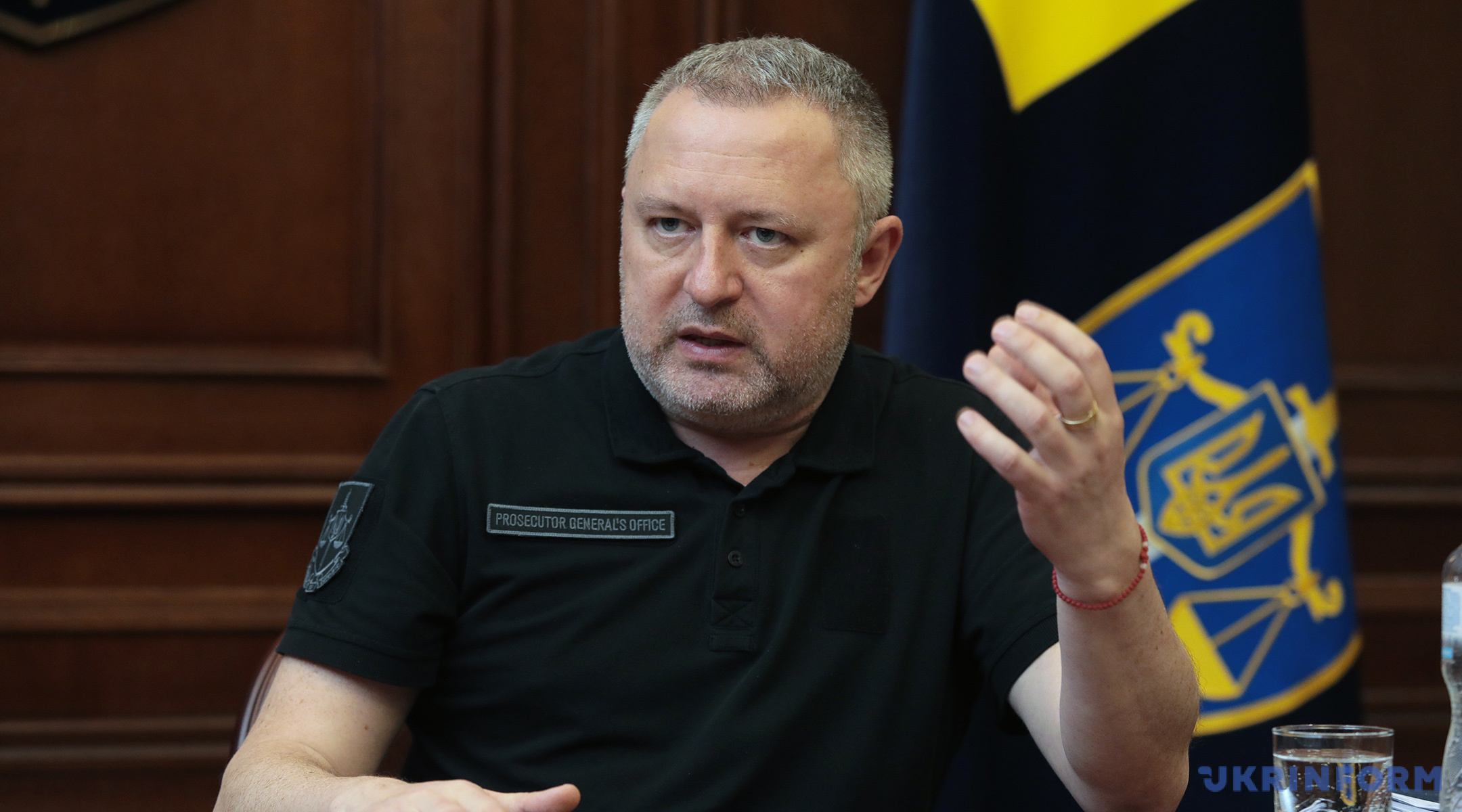
- Andrii Smyrnov, the Deputy Head of the Presidential Office, said recently that the Coordination Group, which already includes 38 countries, is considering the option of setting up a so-called “internationalized tribunal” for the crime of Russian aggression against Ukraine. According to him, the United States, the United Kingdom, and Germany, which had previously been advocating a so-called hybrid model, have already supported this proposal. Please tell us what exactly the model of an internationalized Special Tribunal involves.
- An internationalized tribunal is something that was proposed as a hybrid tribunal by some of our partners and got subsequently renamed to an internationalized tribunal.
- So, judging by the response from our President to the suggested hybrid tribunal, it does not sit well with us?
- You see, the price of my “yes” or “no” response is very high, and it generally has to do with this country’s interests rather than with my stance. No simple answers to complicated questions should be expected. I can say that the discussion still continues. There is an effort on behalf of all members of the Coordination Group to find a common solution.
The discussion on the formula of the Special Tribunal is still underway, but the progress is quite visible. A year ago, the very idea of a tribunal would arouse scepticism from our partners. We are discussing the formula itself, the model of the future tribunal now.
Why do certain reservations about setting up a tribunal exist? Basically, there are two models. The first one involves signing an international treaty. It is simple in a sense that, at the level of international law, signatory states to such a treaty may apply any previously existing practice, going back to Nuremberg. The problem with such an international treaty has to do with the availability of political will in those countries that support the idea of a tribunal. If an international treaty-based model of a Special Tribunal were to be applied, it would entail the need for ratification by these countries’ parliaments. In other words, a treaty may be signed with the country’s executive branch, but must be confirmed by the legislature. It might take a long time as well.
The other model is based on an agreement between the UN Secretary-General and Ukraine. For this agreement to be signed, it must be backed by the UN General Assembly. It is quite obvious that adopting a decision to set up the Special Tribunal by the UN Security Council is not certain because of the position taken by some countries. That is why we are currently discussing two options: an international tribunal established by a resolution of the UN General Assembly, while the other option involves an internationalized tribunal that would include Ukrainian and foreign judges acting on the basis of Ukrainian law.
- Which allows conviction in absentia…
- But does not allow prosecuting Putin, since he has immunity. That is, there are two basic positions to work on, which, in my opinion, will help us find the outcome.
- In an interview to Ukrinform, Howard Morrison, an ICC ex-judge who is also your advisor, said that it would only make sense to set up a Special Tribunal if it could judge in absentia, because Russian top officials would not appear in court voluntarily.
- Conviction in absentia is possible. This is what differs the Special Tribunal from the ICC. The ICC cannot judge in absentia. Whereas the Tribunal can. The Ukrainian people should not wait too long.
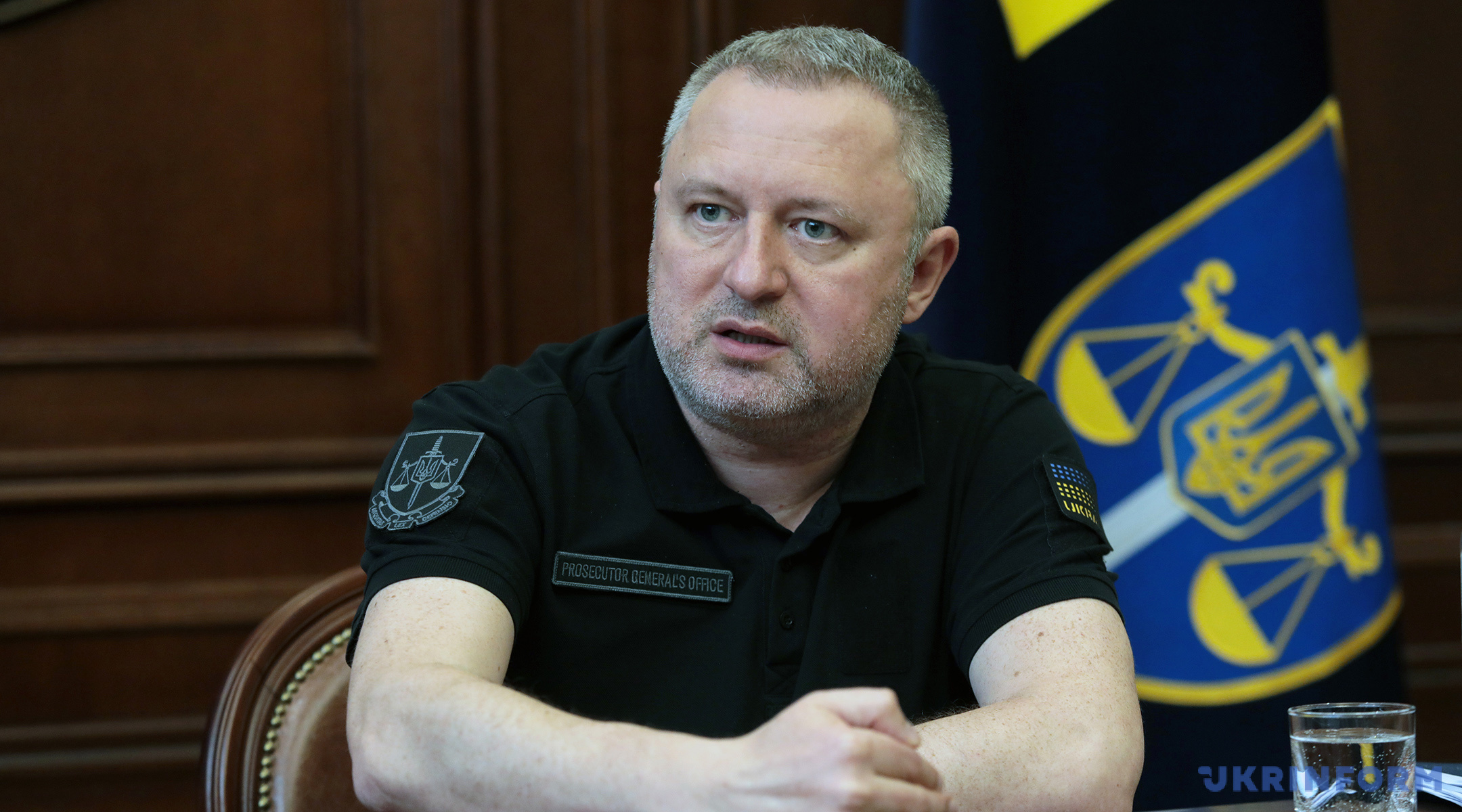
WE ARE DRAFTING DOCUMENTS TO PUT ANTON KRASOVSKY ON THE INTERNATIONAL WANTED LIST
- We’ve talked about the international condemnation of Russian criminals. Please tell us how many Russian servicemen have been convicted of war crimes by Ukrainian courts.
- Among the Russian servicemen, we have 383 suspects. 220 persons are charged offenders. 54 servicemen were sentenced, 39 of them — in absentia. It may seem like a small number. However, our international partners are surprised by the fact that we are successfully investigating these crimes and pass sentences during the war.
We regard convictions by Ukrainian courts as the first stage in restoration of justice. It is essential that all procedural actions are taken flawlessly now. This would prevent problems in the courts of international or other jurisdictions. Therefore, these investigations will take time. It’s a marathon, not a sprint.
Those involved in the shooting of Ukrainian POW Oleksandr Matsiievskyi are yet to be identified
- In an interview given last spring, representatives of the Wagner PMC confessed to the mass murders of Ukrainian civilians in Bakhmut and Soledar. Ukrainian law enforcement officers opened a criminal case over the incident. Did the investigation confirm the testimony of the Wagner members?
- We did not ignore this interview either. The SBU has registered criminal proceedings over the violation of the laws and customs of war. The investigation is ongoing, and we are working to establish the circumstances and collect relevant evidence.
- Did the SBU investigators manage to identify those Russian servicemen who shot Oleksandr Matsiievskyi?
- This case is a priority for investigators and prosecutors. As of now, those involved in the shooting of Ukrainian POW Oleksandr Matsiievskyi are still being identified.
- I can’t avoid asking you about the punishment for Russian propagandists. In May, we wrote that, because of the resignation of Lidiia Shchebuniaieva, a judge of the Shevchenkivskyi District Court in Kyiv, hearings in the case of calls for the genocide of Ukrainians against Russian propagandist Armen Gasparyan, as well as in the case against Russian political strategist Timofey Sergeytsev, would be held anew. Before that, hearings in these cases had not actually been held for a year. How is the investigation into the cases of Russian propagandists Solovyov, Skabeyeva, Kiselyov, and Simonyan progressing? In the spring of last year, there was information about giving them notices of suspicion. When will the indictments against them be forwarded to court?
I assure you that all those who, in recent years, have been creating an environment of hatred and calling for the genocide of Ukrainians will be held accountable for their actions
- They are not the only ones who have been given notices of suspicion. Among the 673 defendants in the “master case” on the crime of Russian aggression, who include the highest military and political leadership of the Russian Federation, there are 10 propagandists and representatives of the so-called Russian culture — journalists, actors, and singers. We qualify their actions as an encroachment on the territorial integrity, unleashing and waging of an aggressive war.
Among the propagandists, the first to be sentenced was Anton Krasovskyi, a director of the RT TV channel, who publicly called for the drowning of Ukrainian children. He is already on the EU sanctions list, and we are preparing documents to put him on the international wanted list.
As for the rest, the SBU is still conducting the necessary examinations, but I assure you that all those who, in recent years, have been creating an environment of hatred and calling for the genocide of Ukrainians will be held accountable for their actions.
THE INVESTIGATION EXAMINED THE MATTERS OF KULINICH’S APPOINTMENT AND TRANSFERS
- Mr. Kostin, let’s move on to the internal “goings on”. A year ago, when you became the Prosecutor General, you signed an order appointing Oleksandr Klymenko as the SACPO Head. Legally, this agency is a structural subdivision of the Office of the Prosecutor General. Since then, Klymenko has been raising the issue of SACPO’s independence. He wants to be able to enter information on MPs into the Unified Register of Pre-trial Investigations, to forward requests abroad for extradition of defendants. What is your position on this matter? Will you be willing to stop signing notices of suspicions to MPs?
- I am in constant working contact with the SACPO Head, and I think that this year the public has already seen the results of our successful cooperation, and this work continues… It is essential that the SACPO has sufficient resources and opportunities to operate efficiently. Last year, I opened 8 new prosecutors’ vacancies and recently — 7 more SACPO prosecutors’ vacancies.
Work is currently underway to boost the institutional capacity of the Specialized Anti-Corruption Prosecutor’s Office in those areas that do not require legislative amendments. This also applies to the assessment of SACPO prosecutors’ work.
Even now, we can do it without amending the law. The rest falls within the competence of the parliament. Including the question of who enters information on MPs in the URPTI. If the parliament votes to approve it, so it will be.
The point is that a draft law No. 8402 is pending before the parliament, which strengthens the SACPO’s independence, but the Committee on Law Enforcement rejected the bill this winter. Instead, it had set up a task group to draft a new bill, but apparently it hasn’t come up with anything yet…
- This is a matter for the parliament. By the way, the task group that you mentioned also includes representatives from the Office of the Prosecutor General. The same goes for other task groups, which are plenty.
- Once again, I would like to emphasize that expanding the SACPO’s powers is mostly a matter to be addressed by legislative initiative entities.
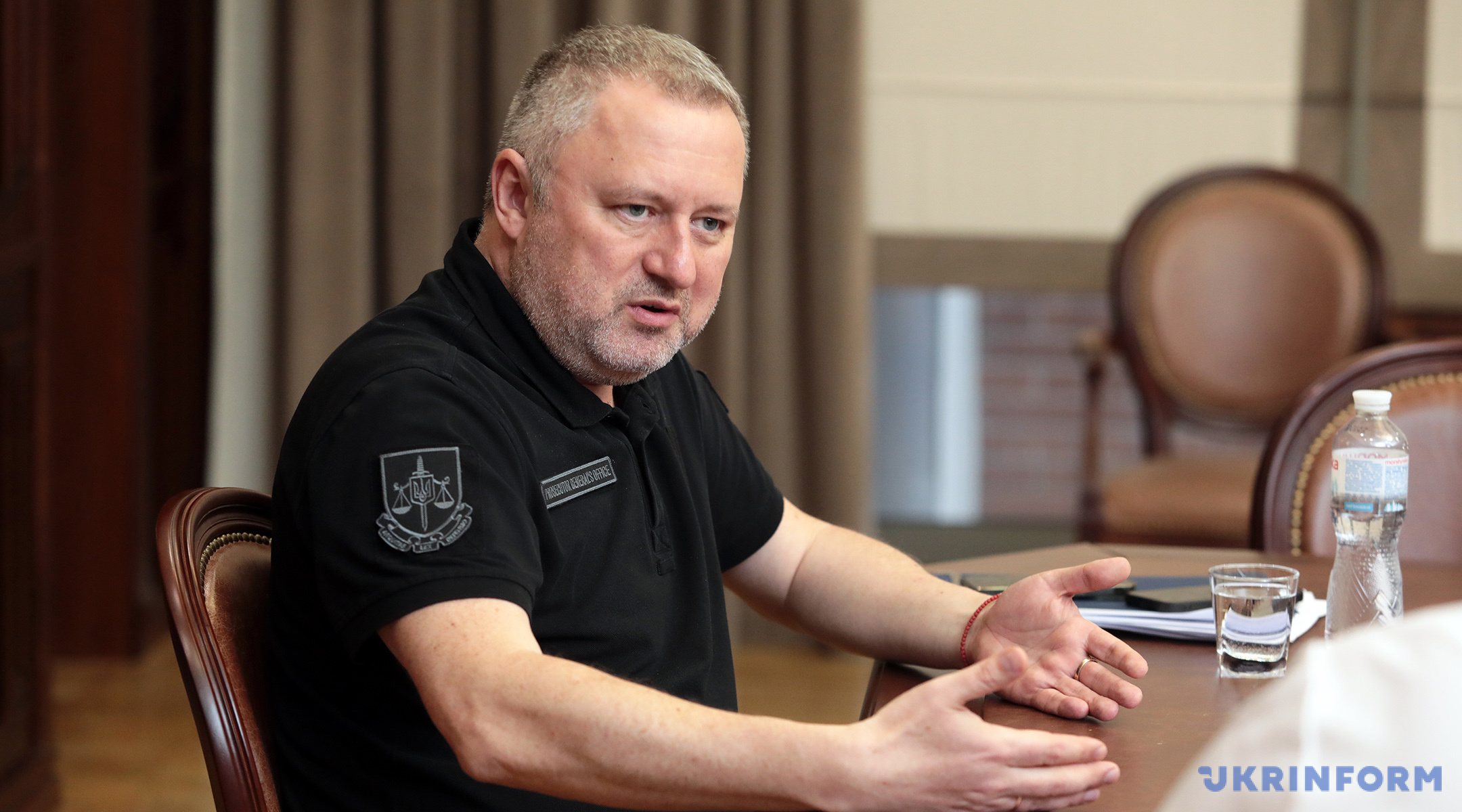
- This country has seen so many corruption scandals. This gives the impression that our foreign partners were right to believe that Ukraine was a corrupt country. What worries me in this situation is the extent to which this attitude of theirs can hinder our European integration.
We cannot live in a society that is completely hypocritical, where everyone stands publicly against corruption, but whenever citizens need something, they are willing to embrace it
- I think that our partners are aware of the real state of affairs and compare it with the way things were before.
What is significantly different is the scale of law enforcement response to corruption offenses. It is higher by an order of magnitude. And it is precisely this response that, in my opinion, is perceived positively by partners, because they understand that they also have corruption to fight with. It is the principled fight against corruption that is one of the tools of overcoming it.
Let’s not forget that corruption not always amounts to solicitation by an official. Very often it is a proposition coming from a citizen or businessman. Now it is important to conduct public outreach activities to explain that engaging in corruption schemes is counterproductive. We cannot live in a society that is completely hypocritical, where everyone stands publicly against corruption, but whenever citizens need something, they are willing to embrace it.
I would like to refer to the exposure of mobilization avoidance and illegal border crossing schemes as an example. Whenever an official is detained for taking bribes for, let’s say, forged papers, the public would perceive this positively. But what comes next? Where is the public condemnation of those who resort to these, so to speak, “services”? We should talk about this frankly. If we want to live in a successful state, everyone would be required to do their part.
- You appointment followed resignations after traitors were exposed in law enforcement. Last August, you said that one of the first orders that you signed was to conduct an internal investigation into prosecutors in the border oblasts. Other than Mykola Herman, the former head of the Mykolaiv District Prosecutor’s Office, recently sentenced to life imprisonment for high treason, have you found many traitors among prosecutors?
- Indeed, immediately after taking office, I ordered an inspection of the prosecutors’ activities in nine front-line oblasts.
The inspection in six oblasts — Donetsk, Zaporizhzhia, Mykolaiv, Luhansk, Kharkiv, and Kherson — revealed violations of the prosecutor’s oath and crimes associated with Russia’s armed aggression. As a result, ten employees of prosecution authorities — seven prosecutors and three civil servants — were given notices of suspicion of treason or collaboration. All these proceedings in the cases against former employees of the prosecutor’s offices in the Luhansk, Donetsk, Zaporizhzhia, and Mykolaiv Oblasts are currently pending in court.
The investigation has evidence that they participated in the setting up of pseudo-prosecutor’s offices in the temporarily occupied territories, provided information to the enemy, and made false reports of the “crimes” committed by individual units of the Armed Forces of Ukraine against civilians.
And, as you mentioned, the former head of the Mykolaiv District Prosecutor’s Office has now been sentenced to life imprisonment with confiscation of property for treason.
We continue to check information about prosecutors’ alleged collaboration with the enemy and respond accordingly to all such instances.
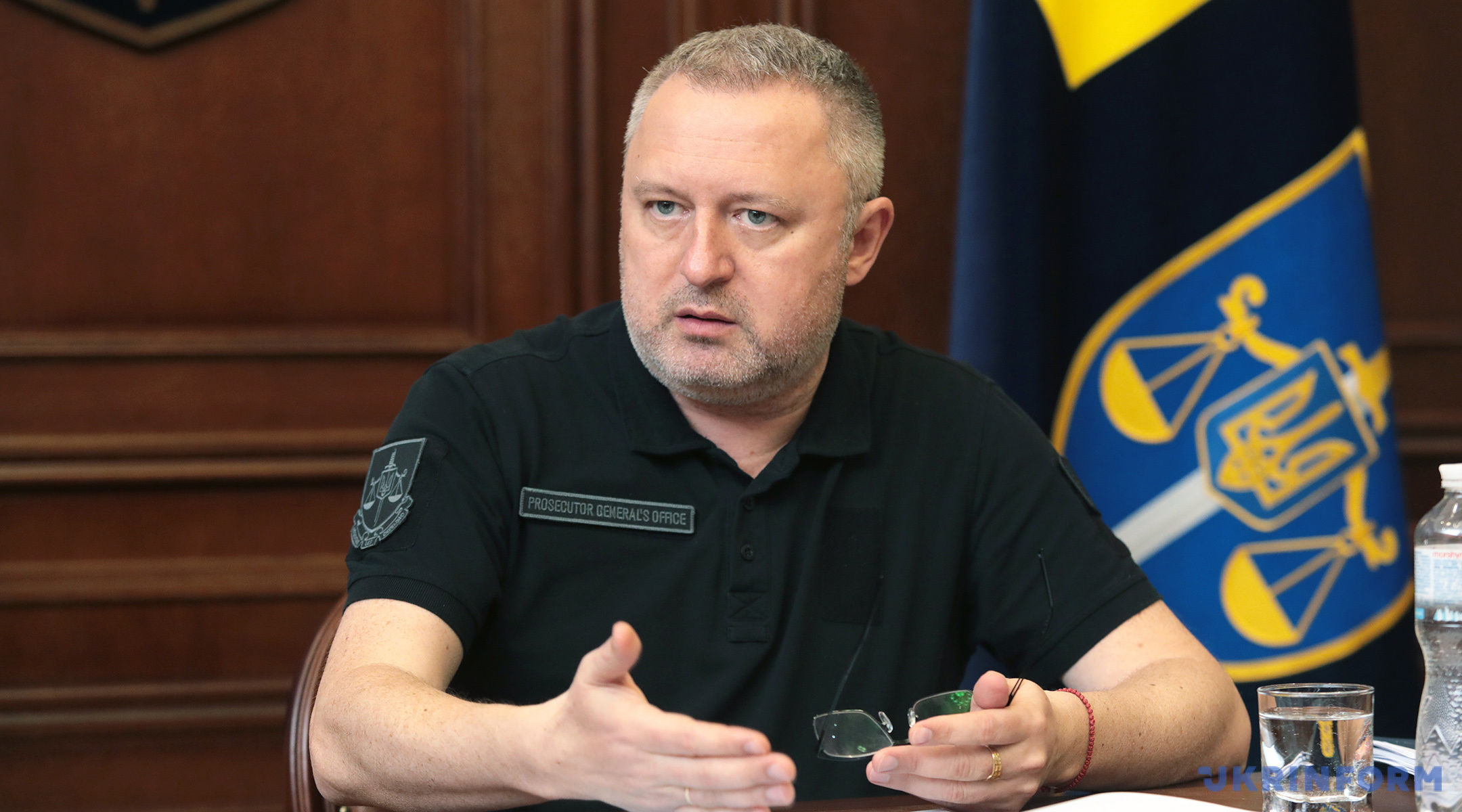
- What is the situation with treason in other law enforcement agencies?
According to our data as of the end of June, 385 National Police officers, 6 Security Service officers, 22 judges and court employees were served notices of suspicion for treason, collaboration, and aiding the aggressor.
Indictments against 266 police officers, 2 SSU officers, and 7 judicial officers have been forwarded to courts.
There is one verdict each in the cases of a former police officer, an SSU officer, and two representatives of the judiciary.
This is the current statistics.
- Let’s talk about the investigation into the case of Oleh Kulinich, the former head of the Crimean SSU, whom Vasyl Maliuk, the then first Deputy Head of the SSU and currently the head of the special service, exposed as collaborator with Russia’s FSB. Kulinich’s case is now pending in court, but there are still many questions. In particular, as our colleagues from the BBC found out, other SSU officers are not mentioned in the Kulinich case file. Even those, whose appointment, according to the investigators, had been lobbied for by Kulinich. If an intelligence network has been exposed inside the SSU, why is Kulinich the only person who is in it?
- According to my knowledge, the files of the pre-trial investigation in the suspected treason by several members of the group, who, together with Kulinich, contributed to the invasion of the Russian Federation, were severed from these proceedings. The pre-trial investigation is also looking into the potential involvement of other persons in these crimes. The investigation in this case also examined the matters of Oleh Kulinich’s appointment and transfers.
This case is now pending in court. As part of the trial, all the circumstances of the case will be clarified and the court will pass its judgment on them.
- There are also questions about the responsibility of Ivan Bakanov, the former SSU head, who recently became a lawyer. In 2020, he recommended appointing Kulinich. It seems as if Bakanov remains untouchable in this case, although, under to the Law on the SSU, the head of the special service is personally responsible for the state of affairs in the agency. According to BBC journalists, he wasn’t even questioned. What can you say about this?
- Basically, I’ve already given you the answer.
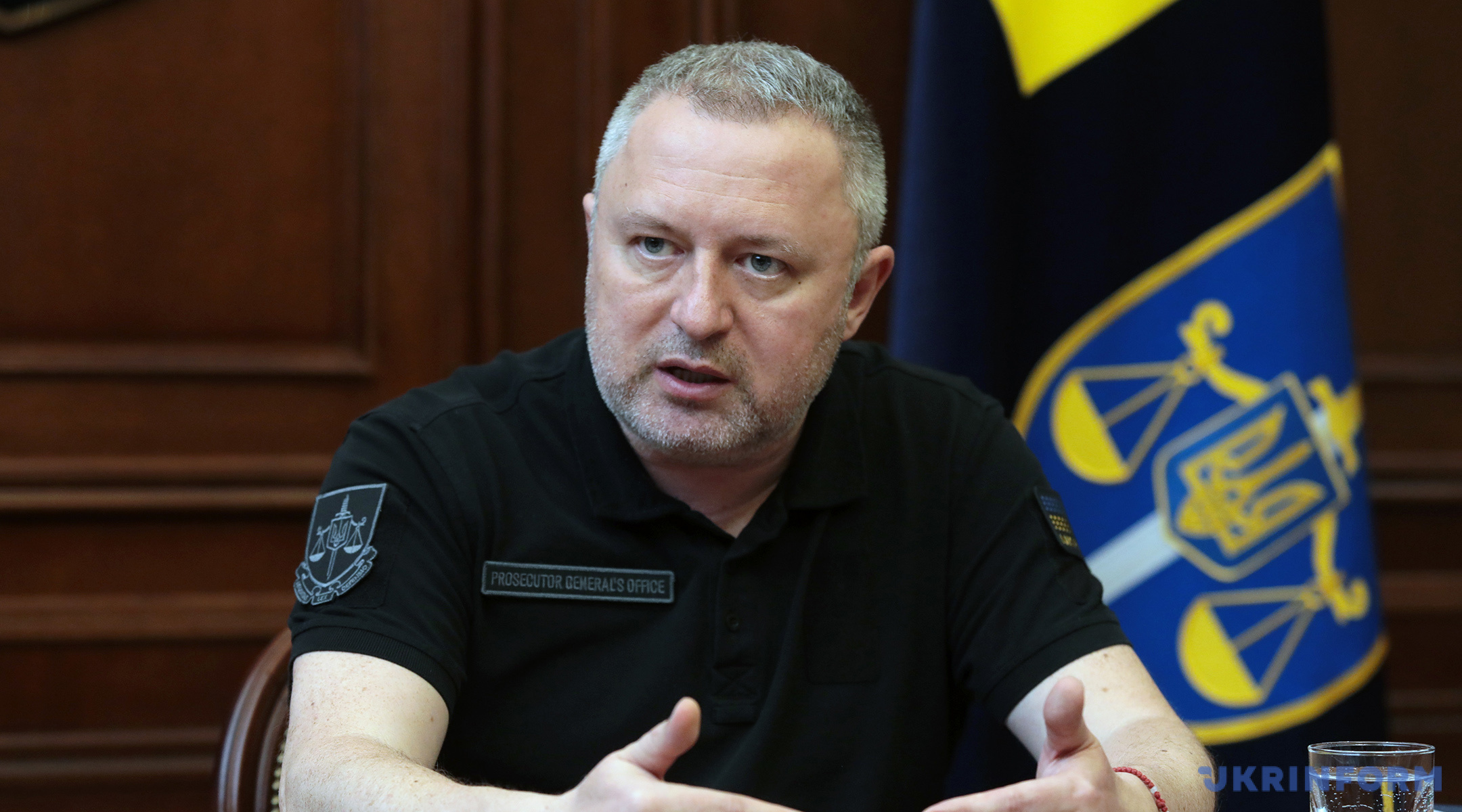
- Then tell us please how the investigation into the terrible helicopter crash in Brovary is progressing, in which nine Interior Ministry employees, headed by Minister Denys Monastyrskyi and his first deputy Yevhen Yenin, were killed along with five local residents who were near the kindergarten where the helicopter crashed.
- The investigation is still ongoing. It is being conducted by experts from the inter-agency investigation team comprising the SBI and SSU main investigation departments. The Office of the Prosecutor General provides procedural guidance. Airbus Helicopters specialists are involved in this work. Experts from the Ministry of Defense, the National Police, and the National Guard of Ukraine have also been engaged in the investigation.
Investigative leads related to sabotage or attempts on the lives of public figures have found no confirmation.
Four main investigative leads were followed early in the investigation: an attempt on the lives of statesmen, including sabotage; the downing of the aircraft; a conflict situation on board the vessel; pilot error, technical failure of the vessel, inadequate flight planning, non-compliance with flight rules, and adverse weather.
As of today, all the necessary technical documentation has been collected. The required expert examinations are being finalized.
With the help from our French partners in Airbus, the flight recorder data was decoded. Based on the collected data, a 3D modelling of the tragic flight was performed.
I may tentatively say that investigative leads related to sabotage or attempts on the lives of public figures have found no confirmation. We will announce the final conclusions of the pre-trial investigation in the near future.
THE INTERESTS OF THE INDIVIDUAL SHOULD BE AT THE CENTER OF PROSECUTORS’ WORK
- What do you think our law enforcement agencies lack most to be effective? What is the biggest existing obstacle that must be removed?
- A range of factors is at play here. The first one, of course, is resources. For example, despite all the problems, the Bureau of Economic Security has been showing very good results over the past 3–4 months — a leap forward compared to the previous year. However, the BES is yet to be fully formed and lacks subdivisions in many regions. This results in a situation where other pre-trial investigation bodies also deal with cases that fall under the investigative jurisdiction of the BES, thereby creating an imbalance. The business is rather willing to perceive the BES as the only authority to deal with economic crimes. For the BES to investigate cases of economic crime effectively, it needs to be fully equipped.
The lack of logistical support and personnel poses another problem. With the war, the workload on law enforcement agencies has increased significantly, while resources regretfully remain limited. Of course, as you can see, even in such conditions we can operate proactively, although doing this is impossible over long stretches of time, because people get exhausted. Our employees have to deal with horrific war crimes on a daily basis. Take, for example, Izium, where a mass grave with more than 400 bodies was found! Where law enforcement officers work under fire and threat to their own lives, they certainly require help themselves.
There is also a lack of consistency. To address this, my colleagues in the law enforcement system and I have developed a Strategic Plan for Law Enforcement Reform, approved by the President this May. The plan includes our European integration commitments, along with new working practices for greater efficiency and accountability of law enforcement agencies.
We also need significant changes to the criminal procedure law. This work continues. It had begun even before the full-scale aggression. The Legal Reform Commission under the President of Ukraine has done a lot of work. We need to bring this work to an end now. To operate in wartime and post-war Ukraine, we will need a more effective toolkit, that is, the updated Criminal Procedure Code.
And most importantly… The interests of the individual should be at the center of work for the entire law enforcement system.
Because we still have a repressive model of criminal justice, which pursues the main goal of finding the offender and sending him or her to prison. While the victims’ interests are lost somewhere in the background… The victim has done his or her job, testified, and, most often, no one cares what happens to them. For decades, this vestige of the Soviet era has remained in Ukraine, and it is about time that we finally got rid of it. That’s why in April we set up the Coordination Center for Victims and Witnesses and are currently in the process of competitive selection of coordinators who will work in the regions. With the help of our partners, we will train them, and such centers will be subsequently set up in each region. This will be a pilot project intended for victims and witnesses of war crimes. But my goal is bigger — to apply this to the entire law enforcement system.
- Do you need any legislative changes to achieve this?
- For the most part, this will require a modified approach. After all, there is a person, a taxpayer, whose freedom and security are guaranteed by the State. And if they are violated, the State must restore them or provide fair compensation through various means. Basically, the entire operation of the law enforcement system should be based on the premise that the victim must be put at the center of their efforts. This is essential. This is what will increase trust in the law enforcement system. This job will take years, but we have started it.
Maryna Synhaivska, Alla Shershen
Photos by Hennadii Minchenko
